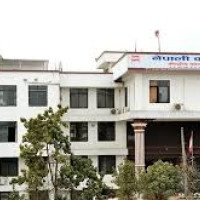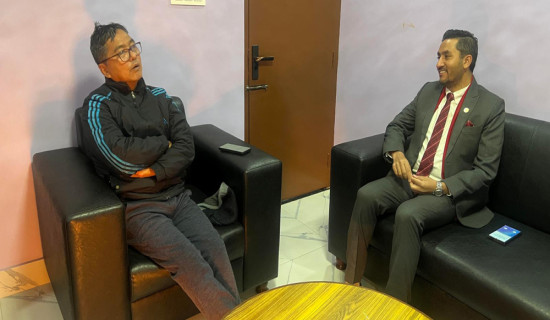- Thursday, 8 January 2026
Nepal stresses on multilateralism at Boao Forum
Boao, Chaina, Mar. 31: Nepali representatives at the annual conference of Boao Forum of Asia (BFA) 2024 said that Nepal accorded value to multilateralism in order to achieve national development goals.
Speaking at a session on ‘Global Development Initiative (GDI): Promoting world peace’, former Deputy Prime Minister and vice-chair of CPN-UML, Bishnu Prasad Paudel, said that Nepal values multilateralism and remains committed to contributing actively to discussions within the GDI framework and other international forums.
“We will work with China and like-minded partners to further promote a development agenda that is both universal and beneficial to all. Through open and constructive dialogue, addressing all voices, and focusing on areas where needs are strongest, we believe the GDI can become a powerful force for building a more prosperous, peaceful, and sustainable future for the world,” he said.
The GDI was proposed at the General Debate of the 76th Session of the United Nations in September 2021 as a call for international commitment to development as a priority, a people-centred approach, benefits for all, innovation-driven development, harmony between man and nature, and result-oriented actions, reads a UN document.
According priority to the issues like poverty alleviation, food security, financing for development, climate change, digital economy and connectivity, GDI aims to accelerate the execution of the Sustainable Development Goals (SDGs), also known as 2030 Agenda. The GDI was proposed by Chinese President Xi Jinping at the UN session.
Commending on China’s leadership in launching the GDI, Paudel said that its priorities strongly resonate with Nepal’s own development aspirations and priorities.
However, he maintained that a close cooperation, knowledge sharing, and innovation promotion among the countries is needed to meet the targets of the Initiative.
“We are confident that increased collaboration in areas like infrastructure development, technology transfer, and capacity building will accelerate Nepal’s national development efforts. We look forward to the GDI facilitating projects that are transformative to our economy and address Nepal’s specific development needs,” said Paudel.
Likewise, he stated that to ensure the GDI’s goals of sustainable and equitable development are achieved, it is important to acknowledge and address concerns such as transparency and debt sustainability. “Concessional financing, knowledge sharing, and projects tailored towards the specific needs of developing countries will not only further solidify the GDI’s purpose but also bolster trust and inclusiveness within the initiative,” he said.
Meanwhile, Dr. Rupak Sapkota, Foreign Affairs Advisor to Prime Minister Pushpa Kamal Dahal ‘Prachanda’ addressed a session at the BFA where he highlighted Nepal’s priority to multilateralism and concerns to increasing political polarisation.
“Due to geopolitical conflicts, increasing political polarization in world politics and poor cooperation, it is becoming difficult to advance Nepal’s international cooperation on multilateral and economic issues as desired,” he said.
Dr. Sapkota requested the international community to help Nepal in its goal of upgrading from a Least Developed to a developing country, addressing climate change disaster in a timely manner and achieving overall economic development and prosperity of Nepal.
Nepal is graduating to a ‘developing country’ status in 2026.
“ Platforms like the Boao Forum should be focused on addressing global issues such as the economic crisis, energy and food crisis, and the impact of climate change that the world is currently facing,” said Dr. Sapkota.
The four-day annual conference of the BFA concluded on Friday. The conference themed ‘’Asia and the World: Common Challenges, Shared Responsibilities’, brought together more than 2,000 delegates from about 60 countries in Boao, a coastal city of China.
Speaking at the closing press conference of the Forum, its Secretary General, Li Baodong, said that the Annual Conference 2024 has achieved the goal of carbon neutrality through various ways to promote energy conservation and emission reduction.
According to him, the BFA’s conference reached a series of consensuses including forging solidarity, cooperation and multilaterism among the members to meet the challenges, creating multilateral trading system based on principles of fairness and openness, helping developing countries with green financing and promoting scientific and technological progress and innovation and at the same time guarding against its risks.
BFA was created in February 27, 2001 as a forum to discuss the Asian perspectives in economy development and other relevant topics in the emerging global contexts, as an alternative to the World Economic Forum. It aims at bringing the Asian nations together and promoting greater economic integration in the region.












-original-thumb.jpg)



